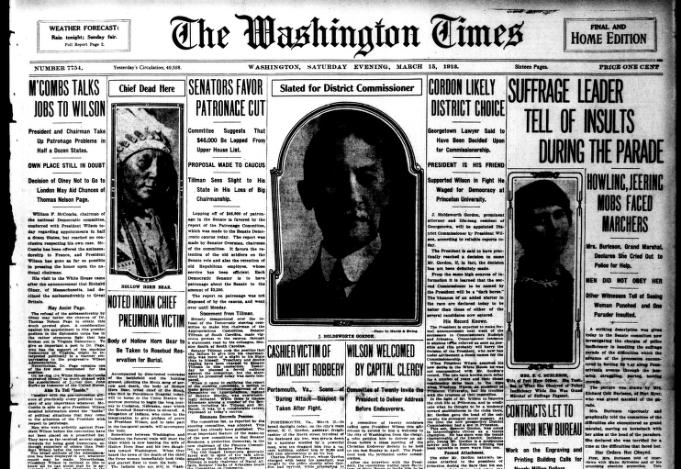|
Moderated by NW Okie! |
Volume 15 , Issue 112013Weekly eZine: (374 subscribers)Subscribe | Unsubscribe Using Desktop... |
1913 - Suffrage leader Tell Of Insults During Parade

In the Washington Times, dated Saturday, March 15, 1913, one of the front page headlines read: "Suffrage Leader Tell of Insults During the Parade." Howling, Jeering mobs faced marchers. Mrs. Burleson, Grand marshal, declared she cried out to police for help. Men did not obey her. Other witnesses tell of seeing woman punched and one parader insulted.
This striking description was given today to the Senate committee now investigating the charges of police inefficiency in handling the suffrage parade of the difficulties which the advance of the procession encountered in forcing its way along Pennsylvania avenue through the jamming, struggling jeering, hooting crowds.
The picture was drawn by Mrs. Richard Colt Burleson, of Fort Myer, who was grand marshal of the parade. Mrs. Burleson vigorously and graphically told the committee of the difficulties she encountered as grand marshal, moving on horseback with her aides at the head of the paraders. She declared she was terrified for a time at the difficulties that faced her.
Her Orders Not Obeyed
First, Mrs. Burleson told of interviews with Major Sylvester and of his promising absolute protection. This was on Sunday before the parade, when she furnished him the line of march. She warned him ropes would not keep the crowd back, and he agreed to send autos ahead and sixteen mounted police to clear the way.
Mrs. Burleson asserted Major Sylvester told her that her orders to the police would be obeyed by them. But these orders were not obeyed, she asked for assistance of an officer and he impudently turned down her request.
"He said he wouldn't move; that he had his orders," said Mrs. Burleson. She threatened to report him, and he said: "Report! What harm will that do? Go on and report." The crowd hooted at her and jeered when they saw her rebuffed by the policeman. Another policeman near laughed.
Senator Jones, pointing out there were several police in the room, asked her if the man who rebuffed her was present. She said she would know him in uniform. The police officers present stood up at command of Major Sylvester, but the offender was not among them.
Faced By Howling Mob
Mrs. Burleson, after telling of the delay in starting, depicted the scene on the Avenue. After about a block, she was faced by "a howling, jeering mob. The automobiles and sixteen mounted police had gone ahead, the crowd surged in back of them, and I saw two women with flags face to face with a howling mob," she said. "I shouted for help. I was twenty-five or thirty feet back from the police and face to face with a mob. I was alone and terrified," declared Mrs. Burleson.
The witness declared the police did nothing, that their efforts were bluffs and that the way for the procession was cleared to some extent by autos belonging to Mrs. Street, Mrs. Timmons, Miss Paul, and another suffrage leader.
As Mrs. Burleson related it, she and her aides, nearly all along the route, were in danger of being swallowed up in the surging thousands. She feared at times for the safety of Miss Milholland, whom she saw back of her. She charged the police with "utter neglect and indifference," saw not one policeman in uniform, she added, and the specials did nothing. The crowd jeered at her and her aides.
"The crowd," she said, "was not composed of women and children. It was composed of young men, rowdies, hooting hoodlums. I was impressed with the number of young and rough men."
When questioned by Major Sylvester, who asked Mrs. Burleson if she recalled that he asked her about the route of the parade and any change made in it. Mrs. Burleson said she did and related what occurred as to this.
Sylvester recalled to her that he had waited at his office two or three hours Saturday evening for that line of march, but did not get it until next day. Mrs. Burleson admitted that she had told Major Sylvester the privilege of grand marshall had been taken from her.
Mrs. David S. Tinnin, of Chevy Chase, related what she knew of Major Sylvester refusing a permit to parade the Avenue. She said he stated that, if the suffragists went over his head, he would not hesitate to make it public that he could not give adequate protection. He informed her and Miss Paul that he did not have over 100 men available to protect it. This was when they first discussed it with him.
Shortly after noon the committee adjourned until Monday at 10 o'clock, when police only would be heard.
Dr. C. W. Childs told of his experiences on the afternoon of the parade. He said there was a congestion south of the Treasury. He saw Major Sylvester giving orders to the police to keep the crowds back off the Avenue. General Johnston also gave orders to keep the crowds off and protect the paraders. This was before the parade came along. Captain Schneider was busy about the Treasury and was giving orders to his men. He had a small boy with him and was afraid for the boy in the crowd. He declared the police on the Avenue between Fourteenth and Fifteenth streets did good work.
George D. Larash said the police were working, that is the uniformed police. The specials were not. The women were 60 per send of the crowd. He saw two women with six children between them. The women could not be forced back. Mrs. Richard Cald Burleson, who was grand marshal of the parade, was the next witness.
| View or Add Comments (0 Comments)
| Receive
updates ( subscribers) |
Unsubscribe
| © . Linda Mcgill Wagner - began © 1999 Contact Me | |
